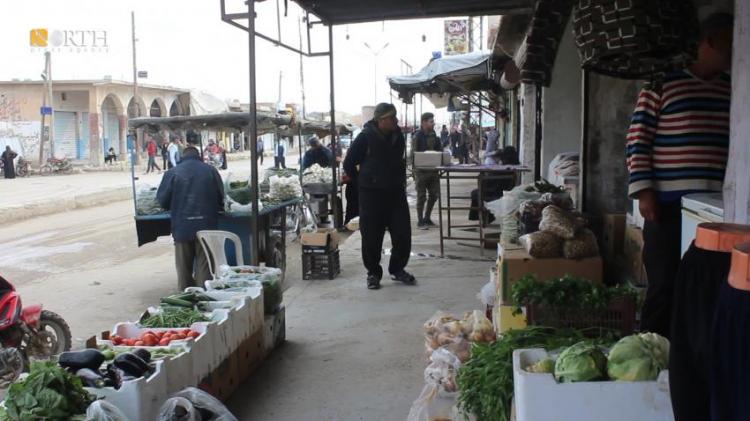Al-Shaddadi – North-Press Agency
Basem al-Shuwaikh
Low-income individuals in the town of al-Shaddadi, south of Hasakah, complain of the deterioration of their living conditions with the extension of the lockdown imposed by the Autonomous Administration in North and East Syria for the second time in April. This was accompanied by other precautionary measures to prevent the outbreak of coronavirus in its areas, including the imposition of restrictions on some businesses and the total closing of others throughout the ban period
.
The suffering of family breadwinners, who depend on a daily wage, increases with the difficulty of securing requirements of their families, especially after the start of the month of Ramadan, which requires an increase in daily expenses.
Ibrahim al-Khudair, a disabled 36-year-old resident of the countryside of al-Shaddadi, told North-Press that he was selling vegetables from a three-wheeled cart, that his money was insufficient, and that the quarantine exacerbated his living conditions. "I work for little money on this cart to support my family of four, but now I cannot provide for them with the length of the ban," he said.
He added that the decision to extend the lockdown period has reflected negatively on him because he depends on a limited daily wage, and that the official decisions did not compensate him for the cessation of his work.
Meanwhile Bassam al-Dakhil, a 29-year-old resident of al-Shaddadi, said that the ban has "negative and positive" sides, and that it was important to prevent the spread of coronavirus in the region. However, he stated that "the decision has a negative aspect that has affected many residents who depend on daily work for their limited income, and their work has stopped."
Al-Dakhil pointed out that the month of Ramadan requires an increase in daily expenses, and that "the high prices increased the problem."
Moreover, al-Dakhil criticized the mechanism for distributing food aid by the Autonomous Administration, noting that it is "not enough for a few days" and that it has not been distributed yet in their area.
"In order for the food aid to be a solution for the people, it must be distributed several times, but they have not distributed any baskets in al-Shaddadi. As for the areas where they distributed food baskets, it was only once, and it was not enough," he said.
In mid-April, a committee of the Social Affairs Authority in Hasakah distributed a number of food baskets to residents of some villages and towns north of Hasakah, but the distribution process was criticized by some residents, as it took place on the basis of lists of names provided by the local councils in the town, while the number of families in need was greater than that listed, according to residents of those villages.
Muhammad al-Sayid, 45, who is in charge of the local council (commune) in the northern neighborhood of al-Shaddadi, said that they collected the names of the families most affected by the ban due to their limited income, and that they submitted them to the city’s general local council (the Communes' Union Council of the city and its villages) in order to distribute food aid.
Nevertheless, they are still awaiting the aid which they will distribute to the residents. "They distributed aid to most of the Hasakah regions, but they have not yet reached al-Shaddadi, the lists are ready and we are waiting for their arrival to distribute them," according to the official.

